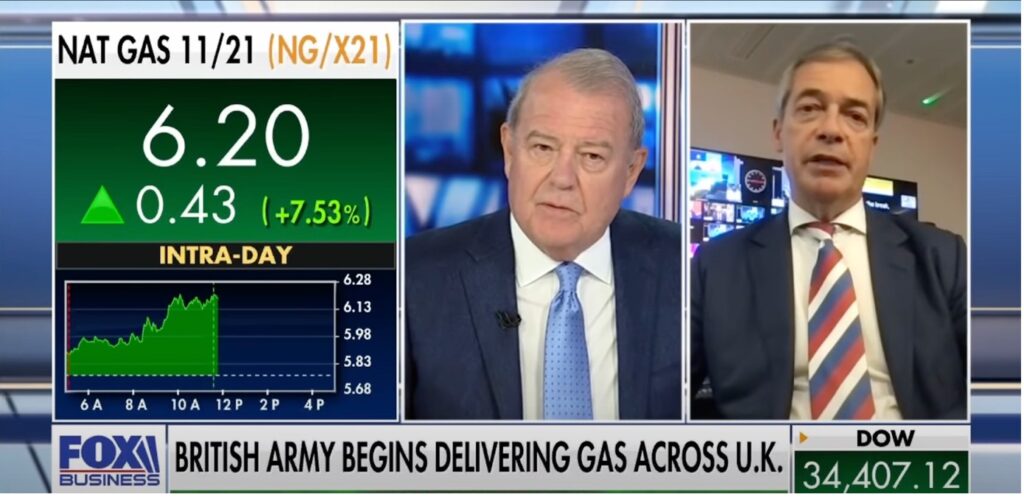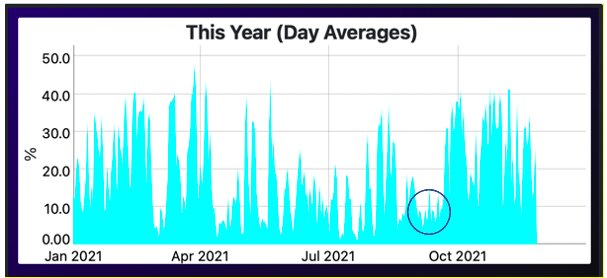On 5 October 2021, British broadcaster and former politician Nigel Farage made a statement about wind energy in September 2021. During the show “FOX Business” on the broadcaster FOX he said that “in September wind energy only produced 2% of the energy needs”. This statement is mostly true.
Nigel Farage is a British broadcaster and a former politician who was Leader of the UK Independence Party (UKIP) from 2006 to 2009 and 2010 to 2016 and Leader of the Brexit Party from 2019 to 2021. Farage campaigned for the United Kingdom’s withdrawal from the European Union. After the vote to leave the EU in 2016, Farage resigned as leader of UKIP, triggering a leadership election. We asked Mr. Farage’s office what the source of information for this claim is, yet we received no reply.
On 5 October 2021, he was a guest on the television program “Fox Business” broadcasted by FOX, where he discusses the truck driver shortage and Prime Minister Boris Johnson’s green initiative. During the show, Farage made the statement that in September, “wind energy only produced 2% of the energy needs”. He added, because of the shortage of the wind energy, Great Britain needs gas to back it up. That makes Great Britain “dependent on Vladimir Putin, who supplies the natural gas market in recent weeks and sets the price higher and higher”.

Wind energy in the UK
Electricity from wind is a rapidly growing energy source in the UK. Renewable sources such as wind are essential in the fight against climate change, and will play a big part if the UK is to reach its promise of net-zero by 2050. From 2009 to 2020 electricity generated through wind in the UK rose by 715%. The UK has a number of both offshore, and onshore wind farms, the largest offshore wind farm in the world is situated on the coast of Yorkshire. According to National Grid, a British multinational electricity and gas utility company, 2020 had record high levels of wind energy generation, and wind energy accounted for 24% of total electricity generation in the UK in 2020. The International Energy Agency suggest that by 2050 90% of electricity will come from renewable sources, with solar and wind being responsible for 70%.
Wind energy in France and Belgium
Due to its very long coastline on the Atlantic Ocean, France should be very important in wind energy in Europe. Despite this coastline, France has no offshore wind farm of its own at all. By comparison, the United Kingdom operates nearly 2,225 wind turbines, which accounted for 45 percent of European installations before the Brexit, followed by Germany (34%) and Denmark (8%). France needs to make much more, because by 2012 only 2.5% of total energy was wind energy.
Belgium ranks fourth in the global ranking of countries producing electricity with offshore wind farms in the sea. Responsible for this good situation is the project “Northwester 2“, which was connected to the grid in May 2020. The wind turbines off the Belgian coast now have a production capacity of 1.7-GW. However, in 2018, wind energy accounted for only 6% of total energy in Belgium. The percentage of wind energy must increase rapidly, because Belgium wants to stop using nuclear energy by 2025.
Expert’s insights
Data show that wind accounts for 18% of the UK’s electricity in September 2021, according to National Grid. Expert and National Grid analyst, Nagina Uppal, told us Farage probably meant otherwise:
“He may be referring to energy as a whole as opposed to electricity alone. Using 2019 estimates for a rough analysis, electricity accounted for approximately 15% of total energy and if we take 18% of this then his figure of 2% is near the mark”, responded the national grid ESO, the electricity system operator for Great Britain.
Though the expert states he would be correct for the year 2019, we were still unsure if these numbers correlate to 2021.
Data analysis of the claim
This graph displays the percentage of energy produced by wind at varying points throughout 2021. During the September period there was a relatively low amount of wind energy produced, and for the most, wind energy used throughout the month remained below 10%.

Wind energy in percentage of 2021. Marked is September 2021
See Gridwatch
Conclusion
To conclude, research about the claim “in September wind energy only produced 2% of the energy needs” shows that British broadcaster and former politician Nigel Farage was partially right in his statement. Wind energy was at a low level of around 2% in September. Of course, there were days with for example 5%, but his statement is almost true. It was hard to find data about wind energy use throughout the whole month, so it would be interesting to find Farage’s source.
RESEARCH | ARTICLE © Frank Fitzpatrick, Sebastian Hinterwirth and Marta Moreno
Cross-national fact check by University of Applied Sciences for Management and Communication, Vienna, Austria; Liverpool John Moores University, UK and IADE-U Institute of Art, Design and Enterprise – University, Lisbon, Portugal, during an Erasmus exchange at AP University College Antwerp, Belgium
Leave your comments, thoughts and suggestions in the box below. Take note: your response is moderated.





